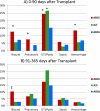Early clinical complications after ABO-incompatible live-donor kidney transplantation: a national study of Medicare-insured recipients
- PMID: 24978035
- PMCID: PMC4411309
- DOI: 10.1097/TP.0000000000000029
Early clinical complications after ABO-incompatible live-donor kidney transplantation: a national study of Medicare-insured recipients
Abstract
Background: Descriptions of the sequelae of ABO-incompatible (ABOi) kidney transplantation are limited to single-center reports, which may lack power to detect important effects.
Methods: We examined U.S. Renal Data System registry data to study associations of ABOi live-donor kidney transplantation with clinical complications in a national cohort. Among 14,041 Medicare-insured transplants in 2000 to 2007, 119 non-donor-A2 ABOi transplants were identified. A2-incompatible (n=35) transplants were categorized separately. Infection and hemorrhage events were identified by diagnosis codes on billing claims. Associations of ABO incompatibility with complications were assessed by multivariate Cox regression.
Results: Recipients of ABOi transplants experienced significantly (P<0.05) higher incidence of wound infections (12.7% vs. 7.3%), pneumonia (7.6% vs. 3.8%), and urinary tract infections (UTIs) or pyelonephritis (24.5% vs. 15.3%) in the first 90 days compared with ABO-compatible recipients. In adjusted models, ABO incompatibility was associated with twice the risk of pneumonia (adjusted hazard ratio [aHR], 2.22; 95% confidence interval [CI], 1.14-4.33) and 56% higher risk of UTIs or pyelonephritis (aHR, 1.56; 95% CI, 1.05-2.30) in the first 90 posttransplantation days, and 3.5 times the relative risk of wound infections in days 91 to 365 (aHR, 3.55; 95% CI, 1.92-6.57). ABOi recipients, 19% of whom underwent pre- or peritransplant splenectomy, experienced twice the adjusted risk of early hemorrhage (aHR, 1.96; 95% CI, 1.19-3.24). A2-incompatible transplantation was associated only with early risk of UTIs or pyelonephritis.
Conclusion: ABOi transplantation offers patients with potential live donors an additional transplant option but with higher risks of infectious and hemorrhagic complications. Awareness of these complications may help improve protocols for the management of ABOi transplantation.
Figures
References
-
- Segev DL, Gentry SE, Melancon JK, Montgomery RA. Characterization of waiting times in a simulation of kidney paired donation. Am J Transplant. 2005;5(10):2448. - PubMed
-
- Gentry SE, Montgomery RA, Segev DL. Kidney paired donation: fundamentals, limitations, and expansions. Am J Kidney Dis. 2011;57(1):144. - PubMed
-
- Segev DL, Simpkins CE, Warren DS, et al. ABO incompatible high-titer renal transplantation without splenectomy or anti-CD20 treatment. Am J Transplant. 2005;5(10):2570. - PubMed
Publication types
MeSH terms
Substances
Grants and funding
LinkOut - more resources
Full Text Sources
Other Literature Sources
Medical


